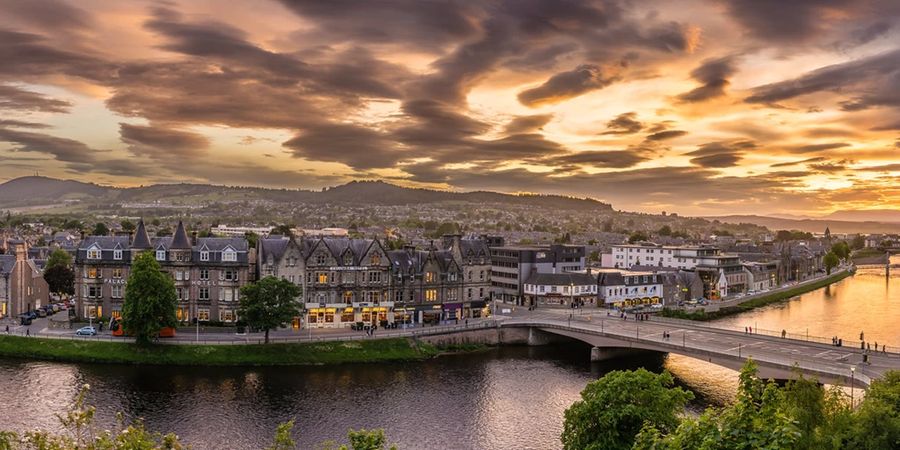
Inverness
Inverness, often referred to as the Gateway to the Highlands, is a charming city nestled along the banks of the River Ness in northern Scotland. As the cultural and administrative hub of the Scottish Highlands, Inverness has played a significant role in Scotland’s history and continues to attract visitors with its stunning landscapes, rich history, and warm hospitality. From its medieval origins to its modern-day significance, Inverness is a city where the past and present seamlessly blend, offering an inviting experience for travelers exploring the Highlands.
Inverness’s history stretches back over a thousand years, and it has long been a site of strategic importance in Scotland. The city was the backdrop for key historical events, including the Battle of Culloden in 1746, the final and most famous battle of the Jacobite Rising, which took place just outside Inverness. The battle marked the end of the Jacobite efforts to restore the Stuart monarchy, and the battlefield, now a visitor center, provides insight into one of Scotland’s most dramatic and poignant moments.
Inverness has also been linked with several key figures in Scottish history, including Mary, Queen of Scots, and Bonnie Prince Charlie, making it a key destination for history enthusiasts. Today, the city serves as both a gateway to the natural beauty of the Highlands and a historical hub that draws visitors interested in Scotland’s turbulent past.
Top 5 Unique Characteristics of Inverness
1. Inverness Castle
Perched on a hill overlooking the River Ness, Inverness Castle is one of the city’s most striking landmarks. While the current structure dates back to the 19th century, there has been a castle on this site since medieval times. The castle has witnessed centuries of conflict, rebellion, and political intrigue. Today, it serves as a courthouse, but visitors can explore its grounds and enjoy panoramic views of the city and the river from the Inverness Castle Viewpoint. Plans are underway to open more of the castle to the public, making it an exciting future attraction.
2. Culloden Battlefield
Located just a few miles from Inverness, Culloden Battlefield is one of Scotland’s most important historical sites. It was here, in 1746, that the Jacobite forces led by Bonnie Prince Charlie were defeated by the British government troops, effectively ending the Jacobite Rebellion. The Culloden Visitor Centre offers interactive exhibits and an immersive experience that brings the story of the battle to life. Walking the battlefield itself is a moving experience, with memorials marking the graves of fallen soldiers from both sides.
3. Loch Ness and the Legend of Nessie
Just south of Inverness lies Loch Ness, one of the world’s most famous lakes, known for its breathtaking beauty and the legendary Loch Ness Monster, or Nessie. While there’s no definitive proof of Nessie’s existence, the mystery surrounding the creature has captivated imaginations for centuries. Visitors can take a boat tour on the loch, visit Urquhart Castle on its shores, or explore the Loch Ness Centre and Exhibition to learn about the history and folklore surrounding the loch and its elusive monster.
4. Inverness Cathedral
Inverness Cathedral, also known as St. Andrew’s Cathedral, is a beautiful example of Victorian Gothic architecture and the northernmost Anglican cathedral in the UK. Completed in 1869, it sits majestically by the River Ness, offering a peaceful retreat from the bustling city. Inside, visitors can admire its stunning stained glass windows and intricate stonework. The cathedral’s tranquil atmosphere and riverside location make it a favorite spot for both locals and tourists.
5. Victorian Market and Inverness Old Town
The Victorian Market is a historic indoor shopping arcade in the heart of Inverness. Built in the late 19th century, the market features a variety of independent shops, cafes, and artisan stalls, making it a charming place to browse for souvenirs or enjoy a cup of tea. The market is a testament to the city’s vibrant commercial history, while the surrounding Old Town area, with its cobblestone streets and traditional buildings, offers a delightful blend of history and modern commerce.
Inverness Today: A Thriving Modern City
While Inverness is steeped in history, it is also a thriving modern city that serves as the capital of the Highlands. Its strategic location makes it the perfect base for exploring the natural wonders of the Highlands, from the Cairngorms National Park to the Isle of Skye. Inverness is known for its lively arts and music scene, with events like the Inverness Highland Games and Blas Festival celebrating traditional Scottish culture.
The city’s vibrant food scene features everything from fine dining to cozy pubs serving local delicacies such as haggis and freshly caught seafood. Inverness also serves as a hub for outdoor enthusiasts, with opportunities for hiking, cycling, and wildlife watching in the nearby mountains and glens.
Fun Facts About Inverness
Inverness means "mouth of the River Ness," and the city is often referred to as the “capital of the Highlands.”
Inverness was once considered a strategic location by William Shakespeare, as it is where Macbeth plotted to murder King Duncan.
The River Ness is one of the shortest rivers in the UK, but it’s known for its scenic beauty and abundant wildlife, including salmon and otters.
Inverness was voted one of the happiest places to live in the UK in various surveys.
The city’s local football team, Inverness Caledonian Thistle, made headlines in 2000 for their famous victory over Celtic, inspiring the headline: "Super Caley Go Ballistic, Celtic Are Atrocious!"
With its blend of ancient history, natural beauty, and modern vibrancy, Inverness is a city that offers something for every traveler. Whether you’re delving into Scotland’s past at Culloden or Loch Ness or simply enjoying the welcoming atmosphere of this Highland city, Inverness promises an unforgettable experience.